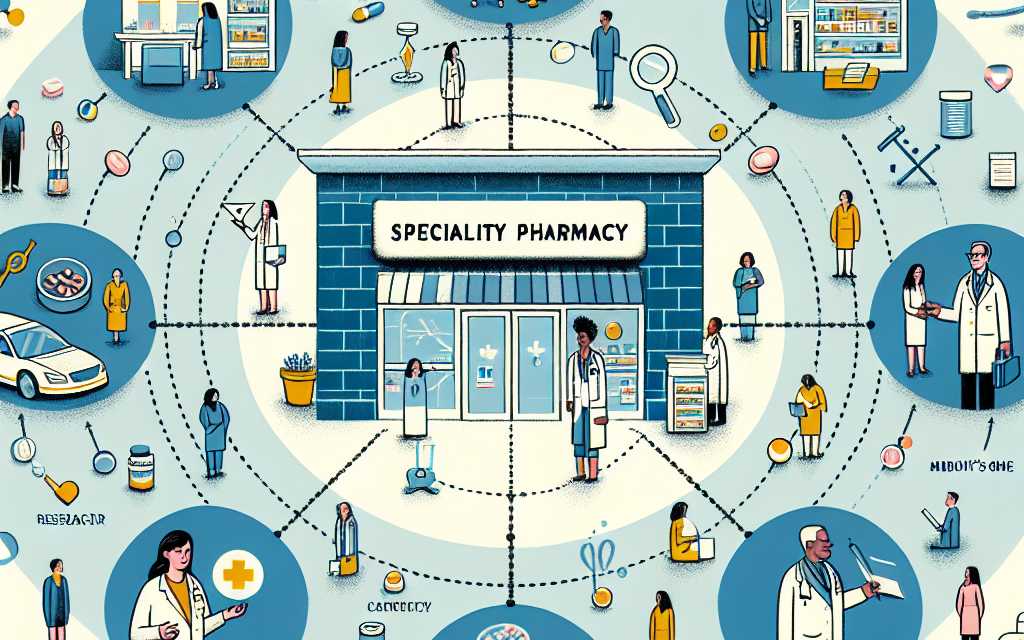Specialty Pharmacies: Connecting the Dots in Healthcare Delivery
In the evolving landscape of healthcare, specialty pharmacies have emerged as critical players in the delivery of medications and patient care. These pharmacies focus on high-cost, high-complexity medications that often require special handling, administration, and patient management. This article delves into the multifaceted role of specialty pharmacies, exploring their significance in healthcare delivery, the challenges they face, and the innovative solutions they provide. We will cover five key subtopics: the definition and scope of specialty pharmacies, their role in chronic disease management, the integration of technology in specialty pharmacy services, the impact of specialty pharmacies on healthcare costs, and the future of specialty pharmacies in a changing healthcare environment.
Understanding Specialty Pharmacies
Specialty pharmacies are distinct from traditional pharmacies in several ways. They primarily focus on medications that are used to treat complex and chronic conditions such as cancer, multiple sclerosis, rheumatoid arthritis, and HIV/AIDS. These medications often require special storage, handling, and administration, which necessitates a higher level of expertise and patient support.
According to the National Association of Specialty Pharmacy (NASP), specialty pharmacies are defined as “pharmacies that provide medications for complex, chronic, and rare diseases.” They offer a range of services that go beyond simply dispensing medications, including:
- Patient education and counseling
- Medication management and adherence support
- Coordination with healthcare providers
- Insurance verification and prior authorization assistance
- Monitoring for side effects and therapeutic outcomes
The scope of specialty pharmacies has expanded significantly over the past decade. According to a report by IQVIA, specialty medications accounted for nearly 50% of total drug spending in the United States in 2020, despite representing only about 2% of prescriptions. This trend underscores the growing importance of specialty pharmacies in managing high-cost therapies and ensuring patient access to essential medications.
The Role of Specialty Pharmacies in Chronic Disease Management
Chronic diseases such as diabetes, hypertension, and autoimmune disorders require ongoing management and treatment. Specialty pharmacies play a pivotal role in this process by providing comprehensive care that addresses the unique needs of patients with chronic conditions.
One of the primary functions of specialty pharmacies is to enhance medication adherence. Studies have shown that patients with chronic diseases often struggle to adhere to their medication regimens, leading to poor health outcomes and increased healthcare costs. Specialty pharmacies employ various strategies to improve adherence, including:
- Personalized medication management plans
- Regular follow-up calls and check-ins
- Educational resources tailored to individual patient needs
- Access to support groups and community resources
For example, a study published in the Journal of Managed Care & Specialty Pharmacy found that patients receiving care from specialty pharmacies had a 20% higher adherence rate compared to those using traditional pharmacies. This improvement can lead to better disease control, reduced hospitalizations, and overall enhanced quality of life for patients.
Moreover, specialty pharmacies often collaborate closely with healthcare providers to ensure a coordinated approach to patient care. This collaboration is essential for managing complex treatment regimens and addressing potential drug interactions or side effects. By working together, specialty pharmacies and healthcare providers can create a more holistic treatment plan that considers the patient’s medical history, lifestyle, and preferences.
Integrating Technology in Specialty Pharmacy Services
The integration of technology into specialty pharmacy services has revolutionized the way medications are managed and delivered. From telehealth consultations to electronic health records (EHRs), technology plays a crucial role in enhancing patient care and streamlining operations.
Telehealth has become increasingly important in specialty pharmacy, especially in the wake of the COVID-19 pandemic. Many specialty pharmacies now offer virtual consultations, allowing patients to connect with pharmacists and healthcare providers from the comfort of their homes. This accessibility is particularly beneficial for patients with mobility issues or those living in remote areas.
Additionally, specialty pharmacies utilize EHRs to maintain comprehensive patient records, which facilitate better communication among healthcare providers. EHRs enable pharmacists to access a patient’s medication history, allergies, and lab results, allowing for more informed decision-making and personalized care.
Another technological advancement is the use of mobile applications that help patients manage their medications. These apps can send reminders for medication doses, track side effects, and provide educational resources. A study published in the American Journal of Health-System Pharmacy found that patients using medication management apps reported higher satisfaction levels and improved adherence rates.
Furthermore, data analytics plays a significant role in specialty pharmacy operations. By analyzing patient data, specialty pharmacies can identify trends, predict outcomes, and tailor interventions to meet the specific needs of their patient populations. This proactive approach not only enhances patient care but also contributes to more efficient resource allocation within the healthcare system.
The Impact of Specialty Pharmacies on Healthcare Costs
As specialty medications continue to drive healthcare spending, understanding the financial implications of specialty pharmacies is essential. While specialty medications are often more expensive than traditional drugs, specialty pharmacies can help mitigate costs through various strategies.
One of the primary ways specialty pharmacies reduce costs is by improving medication adherence. As previously mentioned, higher adherence rates lead to better health outcomes, which can ultimately reduce the need for costly hospitalizations and emergency care. A report from the Pharmacy Quality Alliance (PQA) found that improving medication adherence could save the U.S. healthcare system approximately $290 billion annually.
Additionally, specialty pharmacies often negotiate better pricing with manufacturers and insurers, leveraging their expertise and volume of prescriptions to secure discounts. This can result in lower out-of-pocket costs for patients and reduced overall spending for healthcare payers.
Moreover, specialty pharmacies provide valuable services such as prior authorization assistance and insurance navigation. These services help patients access their medications more quickly and efficiently, reducing delays that can lead to worsening health conditions and increased costs.
Case studies have demonstrated the cost-saving potential of specialty pharmacies. For instance, a large health plan partnered with a specialty pharmacy to manage its members with chronic conditions. The collaboration resulted in a 15% reduction in total healthcare costs over two years, primarily due to improved medication adherence and reduced hospitalizations.
The Future of Specialty Pharmacies in a Changing Healthcare Environment
The future of specialty pharmacies is poised for growth and transformation as the healthcare landscape continues to evolve. Several trends are shaping the direction of specialty pharmacy services, including the rise of personalized medicine, value-based care models, and increased regulatory scrutiny.
Personalized medicine, which tailors treatment to individual patient characteristics, is becoming more prevalent in specialty pharmacy. As genetic testing and biomarker analysis become more accessible, specialty pharmacies will play a crucial role in ensuring that patients receive the most effective therapies based on their unique profiles.
Value-based care models are also influencing the future of specialty pharmacies. These models focus on patient outcomes rather than the volume of services provided. Specialty pharmacies that can demonstrate their impact on patient health and cost savings will be well-positioned to thrive in this environment. This shift may require specialty pharmacies to invest in data analytics and outcome measurement tools to showcase their value to payers and healthcare providers.
Furthermore, regulatory changes are likely to impact the operations of specialty pharmacies. As the government and private payers seek to control rising drug costs, specialty pharmacies may face increased scrutiny regarding pricing transparency and patient access. Adapting to these changes will be essential for specialty pharmacies to maintain their role in healthcare delivery.
In conclusion, specialty pharmacies are integral to the healthcare delivery system, providing essential services that enhance patient care and improve health outcomes. As they navigate the challenges and opportunities presented by a rapidly changing healthcare landscape, specialty pharmacies will continue to connect the dots in healthcare delivery, ensuring that patients receive the medications and support they need to manage their complex conditions effectively.
Conclusion
Specialty pharmacies are more than just dispensers of high-cost medications; they are vital partners in the healthcare ecosystem. By focusing on chronic disease management, integrating technology, addressing healthcare costs, and adapting to future trends, specialty pharmacies are uniquely positioned to enhance patient care and improve health outcomes. As the demand for specialty medications continues to rise, the role of specialty pharmacies will only become more critical in connecting the dots in healthcare delivery.





